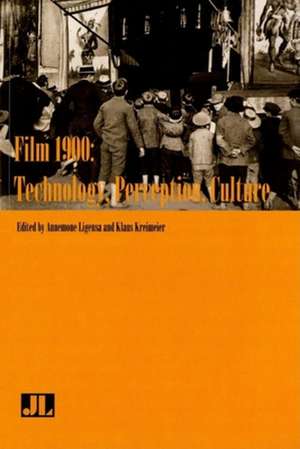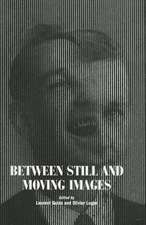Film 1900 – Technology, Perception, Culture
Autor Klaus Kreimeier, Annemone Ligensaen Limba Engleză Paperback – 4 oct 2009
Preț: 169.56 lei
Nou
Puncte Express: 254
Preț estimativ în valută:
32.46€ • 35.27$ • 27.28£
32.46€ • 35.27$ • 27.28£
Carte tipărită la comandă
Livrare economică 21 aprilie-05 mai
Preluare comenzi: 021 569.72.76
Specificații
ISBN-13: 9780861966967
ISBN-10: 0861966961
Pagini: 256
Ilustrații: 50 b&w illustrations
Dimensiuni: 152 x 228 x 18 mm
Greutate: 0.38 kg
Editura: MH – Indiana University Press
ISBN-10: 0861966961
Pagini: 256
Ilustrații: 50 b&w illustrations
Dimensiuni: 152 x 228 x 18 mm
Greutate: 0.38 kg
Editura: MH – Indiana University Press
Cuprins
Provisional contentsPart I: Contemporary CultureThomas Elsaesser: An Art without Origin or Destiny: Why the Cinema is Yet to be Invented; Frank Kessler: Viewing Change, Changing Views: The History of Vision-Debate; Andrea Haller: Seen through the Eyes of Simmel: The Cinema Program as a Modern Experience; Harro Segeberg: Is everything relative?: Cinematography and the Revolution of Knowledge around 1900; Annemone Ligensa: The Sensation Seekers Go to Town: Psychological Differences and Early CinemaPart II: Psychology of PerceptionHenning Schmidgen: Mind the Gap: The Discovery of Physiological Time; Thomas Ballhausen: Improving the Gaze: Connections between Cinema, Psychoanalysis, and X-Rays; Andreas Killen: The Scene of the Crime: German Criminal Psychology and the Problem of Film Spectatorship; Jörg Schweinitz: The Aesthetic Idealist as Efficiency Engineer: Hugo Münsterbergs Theories of Perception, Psychotechnics, and Cinema; Scott Curtis: Lessons in Time Management: Film as Instrument and Object of Temporal RegulationPart III: Technologies, Aesthetics, and PracticesMartin Loiperdinger and Ludwig Vogl-Bienek: From the Magic Lantern to Cinema: Medialization of Picture-Shows and Standardization of Perception; Joseph Garncarz: Exhibition Practices: Film in Variety Theaters, on Fairgrounds, and in Cinemas; Ian Christie and John Sedgwick: Fumbling towards some new form of art?: The Changing Composition of Film Programs in Britain; Tom Gunning: The Attraction of Motion: Modern Representation and the Image of Movement; Ben Singer: On the Sources and Parameters of Early Film Style: Some Considerations; Michael Wedel: Mental Magic: Stereoscopic Vision and the Idea of a Plastic Art in Motion; Nicola Glaubitz: The Art of the Future: Cinema as a Mode(l) of Perception in Dorothy Richardsons Novels and Essays
Notă biografică
Klaus Kreimeier is Professor Emeritus of Media Studies at the University of Siegen, Germany.
Annemone Ligensa received her M.A. in Theater, Film, and Television Studies from the University of Cologne, Germany, where she also worked as a lecturer in Media Psychology.
Descriere
Analyzes transformations in media culture in the early 20th century





